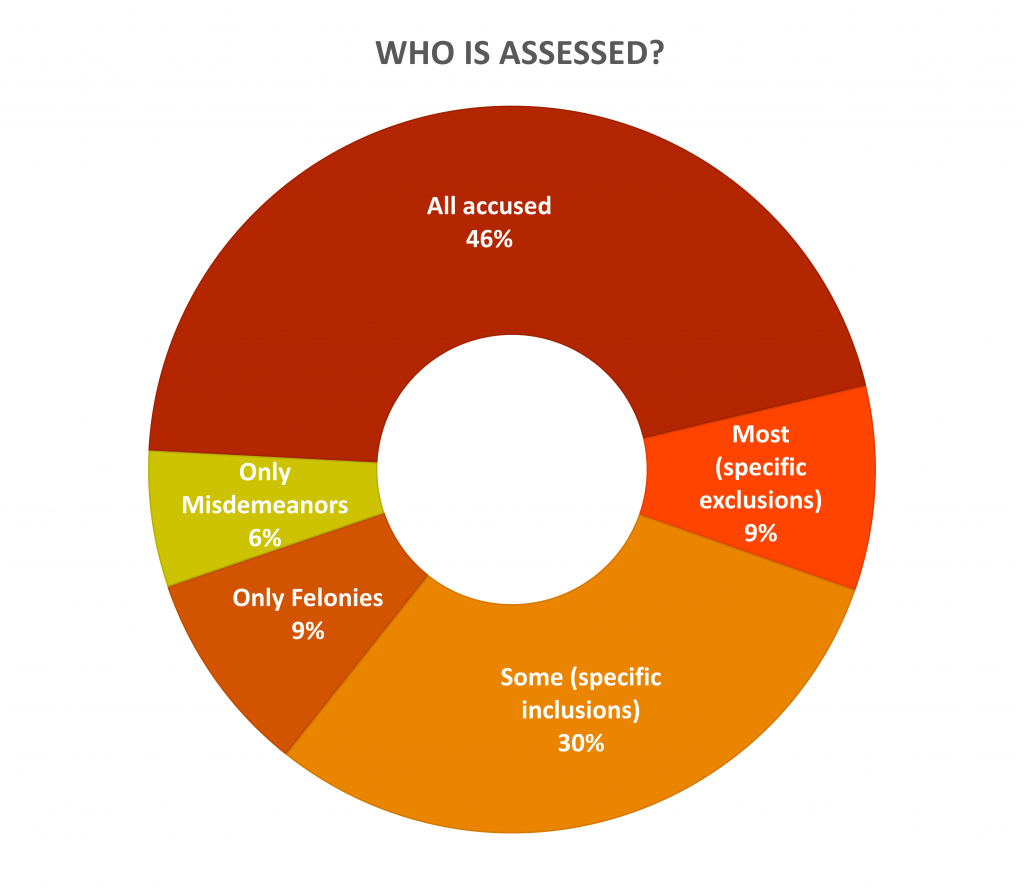Who is assessed and who conducts the assessment varies widely depending on jurisdiction.
Who is Assessed
In just under half the jurisdictions we interviewed, a RAT assesses everyone who is arrested under criminal charges.
However, this is not the case everywhere. Some tools are only used for those arrested for felonies, others only for misdemeanors.
Several jurisdictions we interviewed assessed most of the accused, with specific exclusions. For example, according to our interview with Alachua County, Florida, those with existing warrants or holds from out-of-state or out-of-county charges are not assessed, as these individuals are not eligible for release in the same manner.1Interview with Media Mobilizing Project, 7/2/2019. See Interview Summary for more information Our interviewee from Los Angeles stated that they use their risk assessment tool as part of a bail deviation program. Individuals who meet certain criteria, including having three bench warrants in the past three years or being transient for at least six months, are ineligible for the risk assessment and therefore ineligible for bail deviation.2Interview with Media Mobilizing Project, 4/7/2017. See Interview Summary for more information
Other jurisdictions only use their RAT on some of those arrested, with specific criteria for inclusion. Some jurisdictions exclude the highest level charges and only use a RAT on those charged with bailable offenses or those eligible for pretrial release.
According to our interview with Dekalb County, Illinois, they use their RAT only on those who are unable to immediately post the bond amount set by statute.3Interview with Media Mobilizing Project, 9/15/2017. See Interview Summary for more information Our interviewees stated that Anne Arundel County, Maryland,4Interview with Media Mobilizing Project, 8/13/2019. See Interview Summary for more information and Armstrong County, Pennsylvania,5Interview with Media Mobilizing Project, 7/24/2019. See Interview Summary for more information both use their RATs only for those seeking bail review to reduce their bond.
Some jurisdictions only use their RAT on those individuals for whom that the court has ordered an assessment, while other defendants have to choose to be assessed if they want to be in a pretrial service program. It may allow them to receive services, enter a diversion program, or just to have the score presented as part of a pretrial report.
According to our interview with Vermont, those who are ordered to receive support from pretrial services must be assessed, but others may voluntarily take the assessment to receive services as well.6Interview with Media Mobilizing Project, 7/3/2019. See Interview Summary for more information
The chart below shows who is assessed in the 33 jurisdictions that we interviewed with clear answers to this question.

Total jurisdictions depicted = 33
Who Assesses
The person or agency that conducts the RAT also varies widely.
Many jurisdictions have a dedicated pretrial services unit, which may be housed in the county sheriff’s office, probation, or the courts. Sometimes the county jail staff administers the pretrial RAT.
Some pretrial service agencies are direct government employees, while others are independent agencies contracted with a city or county.
In our interviews, we spoke with representatives from court services, detention centers, sheriff’s offices, community corrections agencies, attorneys general’s offices, district attorney’s offices, and several probation departments.
These representatives were mainly those who conduct assessments directly or oversee the department that does, and therefore did not include any defenders or community organizations.

